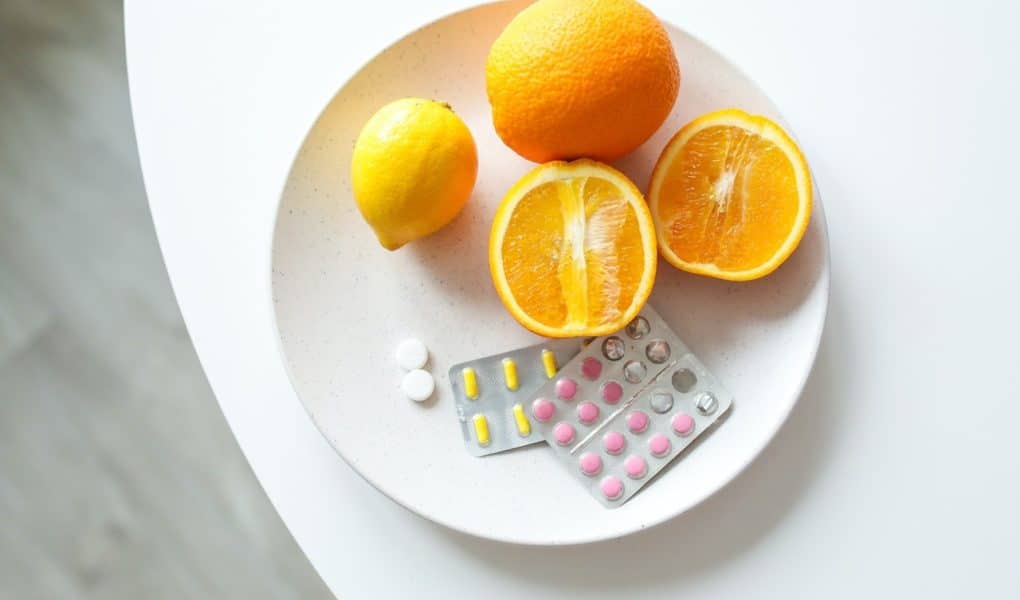With the many natural supplements in the market today, you might be wondering should I take vitamin C supplements or fruit? Is fruit still a good source of vitamin C and can I meet my daily vitamin C requirements through plant sources alone? Unfortunately, the answer is not as simple as yes or no. Dig a little deeper and you discover that fruits and veggies, grown decades ago contained far more vitamins and minerals compared to today. Sadly, much of our food sources have become nutrient-depleted.
Modern agricultural methods have largely concentrated on the production of larger yielding, pest resistant, and climate adaptable crop rather than nutrient-rich food. This has essentially stripped the soil of many of the important nutrients, from which our food sources draw its life. There have been declining levels of most vitamins and minerals in our fresh vegetables across the board. The Organics Consumer Association cites studies that show that vitamin C levels dropped by an average of 30% between 1975 and 1997. Making matters worse is the fact that the average American diet consists of processed, refined grains and way too much sugar.
Since our food sources contain fewer nutrients, many people are looking at dietary supplements to fill the health gap, especially Vitamin C supplements. Vitamin C is an essential nutrient that is not produced in the body, which means we have to get it from food or dietary supplements daily in order to maintain good health. This article has a closer look at vitamin C supplements versus fruit.
Getting your daily dose
A balanced diet that contains a variety of fresh fruit and veggies should be the ideal way in which we get our daily vitamin C requirements. Buying fresh fruit and veggies from certified organic sources is always the best way to go.
Synthetic vitamin C supplements also have an important role to play especially when treating deficiencies, a need for higher dosages to be taken, or other medical reasons.
There are different recommendations set by different health institutions. All of them give a basic guideline of the Recommended Daily Allowance (RDA) for vitamin C. The National Institutes of Health (NIH), recommends a daily intake of 90mg for adult males and 75mg for female adults. Smokers need an extra 35mg more vitamin C than non-smokers on average.
The Linus Pauling Institute recommends a daily intake of 400 mg/day of vitamin C for generally healthy adults.
Did you know that the juice of one lemon alone contains 58mg of vitamin C goodness?
Top FRUIT sources of vitamin C
Kakadu Plums
This Australian superfruit is packed with vitamin C. One little green plum alone gives you 481 mg of vitamin C, which is 530% of the daily value you need.
Acerola cherries
Half a cup (about 50grams) of this little fruit gives you over 900% of your daily value for vitamin C.
Rose Hips
A favorite natural vitamin C source, about 6 rosehip fruits will give you around 130 % of your daily values for vitamin C.
Guavas
The humble guava is also rich in vitamin C and gives you around 140% of your daily value for vitamin C.
Kiwis
Rich in vitamin C, one medium kiwi fruit gives you 78 % of your daily value for vitamin C.
Lemons
The all-favorite lemon will give you 92% of your daily value for vitamin C.
Oranges
One medium-sized orange gives you 78% of your daily value for vitamin C.
Strawberries
One cup of strawberries will give you 89 mg of vitamin C.
Synthetic vitamin C versus FRUIT: a closer look
Synthetic vitamin C, also known as ascorbic acid, is available in many different forms today, of which powder and capsules are the most popular.
A type of Vitamin C called mineral ascorbate is also popular, especially the Sodium ascorbate form. Other forms include Potassium ascorbate, Zinc ascorbate, and Calcium ascorbate. These are buffered forms of vitamin C and may help alleviate diarrhea or nausea in some people sensitive to plain ascorbic acid. Each of these mineral ascorbates contains a mineral part, such as Sodium and Potassium. People who have underlying health conditions should check with their doctor if any of these mineral forms are safe to take in combination with other meds or nutrients.
The benefit of taking a synthetic vitamin C supplement is that if you need higher dosages to treat deficiencies and other disorders and you are not getting your nutrient needs from foods, then supplementing with synthetic vitamin C is a way to achieve that. Since synthetic supplements usually contain higher dosages of vitamin C than wholefood supplements, it is easy to boost your immunity when needed.
Remember, supplementing with much higher dosages of vitamin C should always be done with caution, especially when an individual is taking existing medication or have underlying health conditions. Vitamin C at higher dosages can also interfere with how other nutrients are absorbed in the body, causing an imbalance.
Although the body recognizes synthetic and food-derived ascorbic acid the same way, compared to vitamin C supplements, fruits and veggies still have the edge, since it contains important phytochemicals that play a key role in the absorption of vitamin C.
Citrus fruit sources are rich in fibre, other micronutrients and bioflavonoids, allowing all the parts to function together as a whole.
Interestingly, as one part within the food complex, it has been shown that vitamin C influences the bioavailability of other nutrients like vitamin E.
Natural and organically sourced vitamin C supplements are great for those who want to meet their daily recommended dosages. As mentioned earlier, these natural forms usually come in lower dosages than their synthetic ascorbic acid counterparts. Nevertheless, getting your vitamin C intake from whole food sources is preferred. A variety of natural whole foods are available in vitamin C supplement form too. Look for products that don’t use heat as part of their extraction methods, so that nutrients stay intact. Choose products that are certified organic, are third-party tested, and contain no questionable ingredients such as artificial preservatives, flavors, sweeteners, or fillers. Here are some good ones you might like.
Last thoughts on Vitamin C supplements versus fruit
Your needs will determine which you choose: either vitamin C supplements or fruit-derived goodness. There is definitely a place for both. Even though fruits and veggies are not as healthy or nutrient-rich as they were decades ago, they still contain important nutrients and phytochemicals the body needs for optimum health. Generally, the aim should be to eat as many fresh fruits and vegetables as daily, but when this is not possible, then supplementing with vitamin C is your best bet.
Remember everyone’s needs are different and should be assessed individually, especially when taking a nutrient as a dietary supplement. This is especially true for pregnant or breastfeeding women and those with underlying health issues. Chat with your doctor if you have any doubts or concerns about taking vitamin C as a supplement.
Enjoyed this article? You might like these too:
What are the best organic supplements for babies?
Which essential oil contains vitamin C?
Grow your own vitamin C at home with an indoor citrus tree.
Can I take a Vitamin C supplement before bed?
Cautionary note: Not any of these statements have been evaluated by the Food and Drug Administration. The content of the articles and the products recommended are not intended to diagnose, treat, cure or prevent any disease or health issue. The intention is also not to imply that vitamins or any dietary supplements are substitutes for a balanced diet or are in any way more beneficial or superior to dietary nutrients. It is also not intended to imply that general or normal health may be affected by not taking dietary supplements or receiving intravenous vitamin C infusions.



